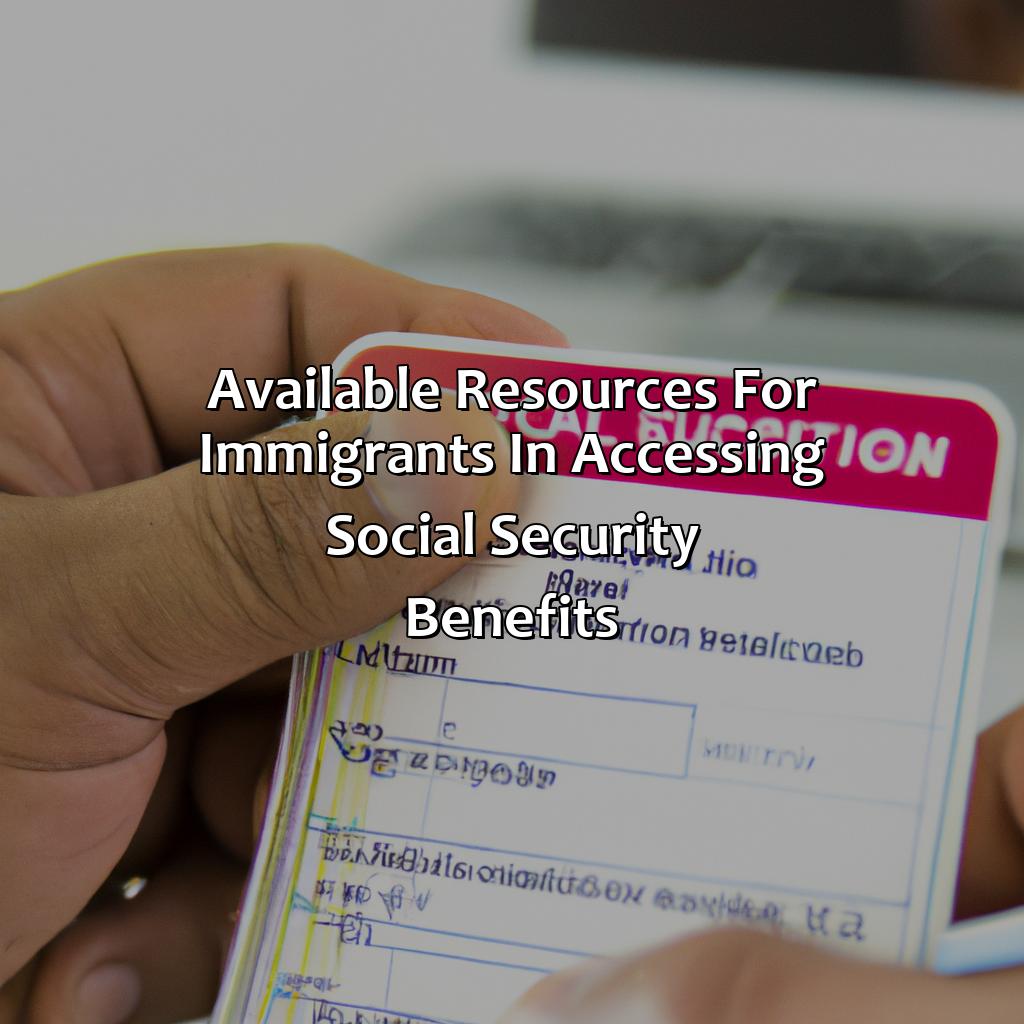How Much Do Immigrants Receive In Social Security Benefits?
Key Takeaway:
- Immigrants who have worked and paid into the Social Security system are generally eligible to receive benefits upon retirement or disability, just like U.S. citizens.
- The amount of Social Security benefits paid to immigrants is based on a formula that takes into account their average lifetime earnings and the age at which they choose to start receiving benefits.
- Factors that may affect the amount of benefits immigrant retirees receive include the length of time they worked and paid into the system, as well as the status of their immigration and residency.
Are you curious about how much social security benefits immigrants receive? Look no further! This article covers the key information you need to understand the benefits immigrants can access in the United States.
Overview of Social Security Benefits for Immigrants
Social Security Benefits for Immigrants – An Introduction. Immigrants, regardless of their legal status and the length of their stay in the United States, are eligible to receive Social Security Benefits. These benefits provide financial assistance to individuals and families who are in need of support due to disability, retirement, or other unforeseen circumstances.
Eligibility Criteria for Social Security Benefits for Immigrants – Understanding the Details. Immigrants need to meet certain eligibility criteria to receive Social Security Benefits. The criteria include factors like age, duration of work, and contributions made to the Social Security program. Immigrants who have worked in the US for a minimum of ten years and who have contributed to the Social Security program for that period are eligible for retirement, survivors, and disability benefits. Immigrants with disabilities and low-income families may also be eligible for Social Security Benefits.
Benefits of Social Security for Immigrants – Know the Details. Social Security Benefits provide a lifeline of support to immigrants who may be struggling to make ends meet due to unforeseen circumstances. These benefits help families and individuals pay bills, purchase essentials like food and medicine, and maintain a basic standard of living. Additionally, some immigrants may also be eligible for supplemental benefits that provide additional assistance beyond what is provided by the standard Social Security program.
According to the Center on Budget and Policy Priorities, in 2019, approximately 25% of Social Security beneficiaries in the US were immigrants or their spouses, and the payments made to them amounted to over $65 billion.

Image credits: retiregenz.com by James Washington
Qualifications for Social Security Benefits
Exploring the eligibility criteria for immigrants and different types of immigration statuses can help you comprehend the qualifications for social security benefits. To attain a better comprehension of the necessities immigrants must meet to receive social security rewards and which statuses are eligible, let’s examine these two sub-sections as a solution.

Image credits: retiregenz.com by David Jones
Eligibility Criteria for Immigrants
Immigrants may qualify for Social Security benefits under certain circumstances. Eligibility depends on immigration status, work history, and other factors such as age, disability, or survivorship. To be eligible, immigrants must have been authorized to work in the United States and paid into the system through payroll taxes. Some categories of immigrants may be eligible for benefits based on their spouse’s or parent’s work record. It is important to note that eligibility rules vary depending on specific circumstances and require careful consideration.
Moreover, some immigrants may be subject to additional requirements such as a waiting period or income limits. For example, non-citizen residents are generally required to wait five years before they can receive benefits unless they are refugees or in another exempt category. Similarly, legal permanent residents with limited work history or income may not meet the earnings requirement for Social Security benefits.
Pro Tip: Immigrants should consult with a trusted advisor or attorney familiar with Social Security policies to determine their eligibility and potential impact on their immigration status.
Why bother having a wall when immigrants can just climb over stacks of social security benefit paperwork?
Types of Eligible Immigration Statuses
Immigration statuses that are eligible for social security benefits vary based on specific criteria. Here’s a breakdown of the authorized immigrant status categories and their eligibility statuses for receiving benefits:
| Authorized Immigrant Categories | Social Security Benefit Eligible? |
|---|---|
| Lawful permanent residents | Yes |
| Refugees and asylees | Yes, after they have been in the country for five years or more. |
| Cuban/Haitian entrants | Yes, after they have been in the country for five years or more. |
| Certain victims of human trafficking, domestic violence, and other crimes | Yes, if they meet certain requirements to receive federal public benefits under section 501 of the Personal Responsibility and Work Opportunity Reconciliation Act of 1996 (PRWORA). |
It is crucial to note that nonimmigrants with valid work permits cannot be issued Social Security numbers unless they can prove unique circumstances. Additionally, undocumented immigrants and Deferred Action for Childhood Arrivals (DACA) recipients are not eligible for Social Security benefits.
Some individuals may face exceptions to these rules due to regional variances on immigration regulations.
There was once a case where an immigrant widow who lived with her husband and worked as a housekeeper did not claim her late husband’s Social Security benefits because she was unaware of her eligibility. However, when she realized that she could qualify for Social Security widow’s benefits, it provided much-needed support during a difficult time.
Why earn a living when you can just immigrate and receive social security benefits?
How Much Immigrants Can Receive in Social Security Benefits
Want to know how much immigrants get for social security?
It depends on many factors. We’ll take a look at these variables and how they relate to benefits. Dive into the sub-sections and you’ll know more about their social security benefits.

Image credits: retiregenz.com by Yuval Woodhock
Calculation of Social Security Benefits
When it comes to determining the value of Social Security Benefits that immigrants can receive, there are several factors to be considered. The Calculation of Social Security Benefits for immigrants is based on a range of variables including work credits, lifetime earnings, age at retirement and immigration status.
The table below highlights the key components that influence the calculation of social security benefits for immigrants:
| Factors Examined | Explanation |
|---|---|
| Work Credits | Minimum 40 work credits need to be earned to qualify for Social Security benefits. |
| Lifetime Earnings | Amount of average earnings over working lifetime considered. |
| Age at Retirement | Early retirement ages determine impact on overall benefit amount received. |
| Immigration Status | Based on individual’s permanent residency or other visa type and duration of stay in the US. |
Notably, how much an immigrant receives in social security benefits may vary greatly depending on their circumstances, such as their country of birth and current privilege status as defined by the State department.
Pro Tip: Every Immigrant applying for Social Security should consult with an experienced immigration attorney before doing so to ensure they have the most accurate information about how these benefits apply to them individually.
Why earn a living when you can just immigrate and live off social security benefits? Just kidding… unless?
Factors Affecting Social Security Benefits for Immigrants
Social Security Benefits for immigrants are influenced by various factors, ranging from the individual’s immigration status, work history, age, marital status to the duration of their stay in the U.S. Immigrants who apply for benefits after meeting all requirements may end up receiving more or less than American-born citizens based on their unique circumstances. Factors such as visa type and duration of stay can impact the benefit amount significantly.
The income earned by immigrants before becoming eligible for Social Security Benefits dictates their payout amount as well. The Social Security Administration calculates these benefits using a complex formula that takes into account a person’s average monthly earnings over the highest 35 years of their career. Lastly, it is worth noting that asylum seekers receive no cash assistance from the government until one year after obtaining asylum status, which could impact when they become eligible to apply for Social Security Benefits.
Given this information, it is crucial for immigrants to keep track of their earnings to ensure they receive the maximum payouts possible. Failing to do so could result in missing out on money that could make a significant difference in their quality of life down the road. It is essential to begin looking into these matters as soon as possible and seek expert advice if necessary.
Accessing social security benefits as an immigrant is like playing a game of Minesweeper but the only bombs are confusing government paperwork and lack of information.
Available Resources for Immigrants in Accessing Social Security Benefits
Immigrants can access social security benefits through various resources that are in place to assist them.
- Immigrants who have been documented and are in the legal status can apply for social security benefits through the government welfare programs.
- Non-profit organizations and advocacy groups can provide legal assistance and advice to help immigrants in accessing social security benefits.
- Community centers and outreach programs usually offer informational sessions and workshops to educate immigrants on the process of applying for social security benefits.
- Individuals can also seek help from immigration lawyers and financial advisors who specialize in social security benefits for immigrants.
Individuals who have a lawful presence in the US can also apply for social security benefits if they have paid into the system or meet the eligibility requirements for certain benefits.
According to the Social Security Administration, in 2019, over 8 million non-citizens contributed to the social security system, adding up to around $13 billion in payroll taxes.

Image credits: retiregenz.com by James Jones
Additional Considerations for Immigrants Receiving Social Security Benefits
Navigating the complexities of immigrants receiving social security benefits in the US requires considering additional factors. To do this, the Tax Implications and Effect on Immigration Status of receiving social security benefits are key. These sub-sections provide clarity on financial and legal consequences for immigrants who receive government benefits.

Image credits: retiregenz.com by Adam Duncun
Tax Implications
When it comes to the impact of taxes on immigrants receiving social security benefits, there are important considerations to keep in mind. The tax implications of receiving these benefits can vary depending on various factors, such as your country of origin and immigration status.
In some cases, immigrants may be subject to federal taxes on their social security benefits. However, some exemptions may apply depending on your individual circumstances. For example, if you reside in one of the 25 countries that have a Social Security Totalization Agreement with the US, you may be exempt from US Social Security taxes.
It is also important to note that certain states may impose their own taxes on social security benefits. These state-level taxes can vary widely and affect how much you ultimately receive in benefits.
As an immigrant, it is crucial to be aware of all applicable tax laws and regulations related to social security benefits. Failing to do so could result in missed opportunities for financial support or even legal consequences.
Don’t miss out on important information about how taxes could impact your social security benefits as an immigrant. Educate yourself on these complex topics and consult with a qualified financial advisor or legal professional as necessary.
Effect on Immigration Status
The receipt of social security benefits may have implications on the immigration status of an individual. It’s important to note that while the receipt of benefits does not disqualify one from obtaining citizenship or legal permanent residency, the use of such benefits could be taken into account when evaluating an individual’s reliance on government assistance programs.
Furthermore, if an immigrant is considered a “public charge,” meaning they are likely to become primarily dependent on government support for their livelihood, they could be deemed inadmissible or denied entry to the US altogether.
It’s essential to consult with an experienced immigration attorney before applying for social security benefits or engaging in any other actions that might affect your immigration status. An attorney can provide you with legal counsel and ensure you remain compliant with applicable laws and regulations.
Pro Tip: Whether you’re eligible for social security benefits will depend on a variety of factors, including your age, work history, and immigration status. Consider speaking with a qualified financial advisor to determine whether receiving these benefits could impact your retirement planning goals.
Five Facts About How Much Immigrants Receive in Social Security Benefits:
- ✅ Immigrants who are not U.S. citizens but are lawfully present may receive Social Security benefits if they have earned enough work credits. (Source: Social Security Administration)
- ✅ Undocumented immigrants are not eligible for Social Security benefits, even if they pay into the system. (Source: National Immigration Law Center)
- ✅ Immigrants who are not lawfully present are generally barred from receiving federal means-tested public benefits, including Social Security. (Source: Congressional Research Service)
- ✅ Some immigrants may be eligible for other types of federal or state assistance programs to supplement income or provide basic needs. (Source: Migration Policy Institute)
- ✅ Immigrants contribute significantly to the Social Security system, with an estimated $13 billion in payroll taxes paid by undocumented immigrants alone each year. (Source: Social Security Administration)
FAQs about How Much Do Immigrants Receive In Social Security Benefits?
How much do immigrants receive in social security benefits?
Immigrants receive social security benefits based on how much they paid into the system while they were working in the United States. The amount of benefits varies based on the individual’s earnings history.
Can undocumented immigrants receive social security benefits?
No, undocumented immigrants are not eligible for social security benefits.
Do immigrants need to be citizens to receive social security benefits?
No, immigrants do not need to be citizens to receive social security benefits. Legal permanent residents, refugees, and other eligible non-citizens may also receive benefits.
Is there a waiting period before immigrants can receive social security benefits?
Yes, there is a 5-year waiting period for most immigrants before they can start receiving social security benefits. This waiting period does not apply to refugees, asylees, or other special immigrant categories.
How do immigrants apply for social security benefits?
Immigrants can apply for social security benefits by visiting a local Social Security office or by applying online. They will need to provide certain personal information and documentation to prove their eligibility.
Are there any special rules or exemptions for immigrants receiving social security benefits?
Yes, there are certain rules and exemptions that apply to immigrants receiving social security benefits. For example, some immigrants may be subject to a federal tax on their benefits, while others may be exempt. It is important to consult with a tax professional or immigration lawyer for specific guidance.


